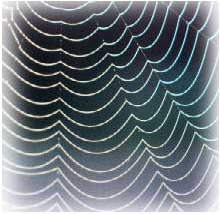 by Flemming Funch by Flemming Funch
Biomimicry is a fascinating subject. It is essentially that you look to nature for ways of building and manufacturing stuff more efficiently, from easily available materials, with no polluting byproducts. Nature is in no way primitive. Human engineering is a bit primitive. Even the smallest plants or animals can carry out manufacturing feats our most skilled engineers often can't accomplish. Look for example at one of our "advanced" high-tech materials, Kevlar, which is used for bulletproof vests. It is created from petroleum-derived molecules poured into pressurized vats of concentrated sulfuric acid, and boiled at several hundred degrees Fahrenheit, and the process wastes a lot of energy and produces toxic byproducts. Now hear what Janine Benyus says about nature:
"Nature takes a different approach. Because an organism makes materials like bone or collagen or silk right in its own body, it doesn't make sense to "heat, beat, and treat." A spider, for instance, produces a waterproof silk that beats the pants off Kevlar for toughness and elasticity. Ounce for ounce, it's five times stronger than steel! But the spider manufactures it in water, at room temperature, using no high heats, chemicals, or pressures. Best of all, it doesn't need to drill offshore for petroleum; it takes flies and crickets at one end and produces this miracle material at the other. In a pinch, the spider can even eat part of its old web to make a new one."
Janis Ian: Music industry spins falsehood "On the first day I posted downloadable music, my merchandise sales tripled, and they have stayed that way ever since." ..."Many artists now benefit greatly from the free-download systems the RIAA seeks to destroy."
MySQL AB is a successful open source business. "In our business model, we have an ecosystem around MySQL, which is huge worldwide. As a company, we are very small in the middle of it. This is very different from the traditional proprietary model. In the past, if you had a fantastic product like Lotus did with Lotus Notes, then you owned or controlled as much as 60% of the surrounding ecosystem, including services, books and education, yourself. We donÂ’t mind that our ecosystem is 200 times larger than our company is. ThatÂ’s why our cost level is ridiculously low. When it looks like weÂ’ve done something, itÂ’s usually someone else who did it."
EContent Magazine: The Siren Song of Structure: Heeding the Call of Reusability "Fusion executive editor Adam Gaffin is clear about the value of breaking down news stories into their atomic bits and sending those elements out to different places. He says, "Granularity is good; it helps us auto-generate syndication feeds, wireless editions, and email newsletters with embedded headlines." Granularity also enables you to put different elements of a page into separate workflows."
American Conservative: Iraq: The Case Against Preemptive War. "Administration's claim of right to overthrow regimes it considers hostile is extraordinary -- one the world will soon find intolerable..."
U.S. Ranks 17th in Freedom of the Press, behind Slovenia and Costa Rica. Doesn't say anything about whether the press is speaking the truth, though.
"You know, the press is free for those who own one." -- Lowell Bergman
|
|
 by Flemming Funch
by Flemming Funch